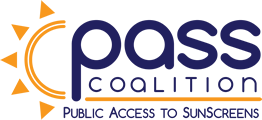May 18, 2018 – PASS Coalition Submits Letter to Hawaii Governor Expressing Concern Over State Legislation Banning FDA-Approved Sunscreen Ingredients
The Honorable David Y. Ige
Governor, State of Hawaii
Executive Chambers
State Capitol
Honolulu, Hawaii 96813
Dear Governor Ige:
On behalf of the Public Access to SunScreens (PASS) Coalition, a multi-stakeholder coalition composed of public health groups, dermatologists, sunscreen manufacturers, and leading advocates for skin cancer patients, we wish to express our concerns regarding Hawaii Senate Bill 2571 that would ban certain widely used sunscreen ingredients. These Food and Drug Administration (FDA)-approved ingredients represent some of the most effective sunscreen technologies legally marketed in the U.S. and help protect native Hawaiians, visitors to Hawaii, and all other Americans from the dangers of skin cancer.
As you know, according to the Surgeon General nearly 5 million Americans each year are treated for skin cancer, making it the most common form of cancer in the United States. Treatments for skin cancer result in $8.1 billion per year in health care spending. The alarming rate of skin cancer means that each year there are now more new cases of skin cancer than the combined incidence of breast cancer, prostate cancer, lung cancer and colon cancer. Melanoma, attributed primarily to UV exposure, is the most deadly form of skin cancer causing one death per hour in the United States. From 1975-2011, rates of melanoma in young men and women ages 20-39 years increased by 34 percent in men and by 84 percent in women.
Radiation from the sun includes both UVA and UVB rays, and both UVA and UVB are responsible for skin cancer. UVA rays are the most abundant source of solar UV radiation at the earth’s surface and penetrate beyond the top layer of skin, while UVB rays are less abundant at the earth’s surface and penetrate less deeply into the skin. Broad spectrum sunscreens including effective protection against both UVA and UVB, are key mechanisms to prevent sunburn, skin damage and skin cancer. Unfortunately, there are few broad spectrum sunscreens on the market in the U.S.
Since 2002, eight new sunscreen ingredients have been submitted for review under the FDA’s Time and Extent Application (TEA) process. The FDA still has not made a final decision on a single sunscreen ingredient through the TEA process, even though some have been waiting for as long as 14 years. Meanwhile, these ingredients have been widely available in Europe, Asia, and Central, and South America for decades.
Hawaii Senate Bill 2571 addresses two key sunscreen ingredients: octinoxate (octyl methoxycinnamate), one of the most widely used UVB-absorbing organic ingredients, and oxybenzone, which is one of the few approved ingredients that provides broad spectrum protection against UV radiation. Because of their effectiveness, these ingredients are used in many sunscreens. Consequently, the legislation at hand could affect 70% of the total market for effective sunscreens. Given the heavy UV exposure for residents of and visitors to Hawaii, banning these ingredients would put these individuals at increased risk of developing deadly melanoma and other forms of skin cancer.
A ban on these ingredients without adequate, FDA-approved alternatives and without extensive research demonstrating that this action is needed to properly balance environmental impact with the risk to public health from inadequate UV protection is premature.
If you have any questions about the PASS Coalition or our views, please feel free to contact me at michael.werner@hklaw.com.
Thank you for your consideration.
Sincerely,

Michael Werner
Public Access to SunScreens (PASS) Coalition
